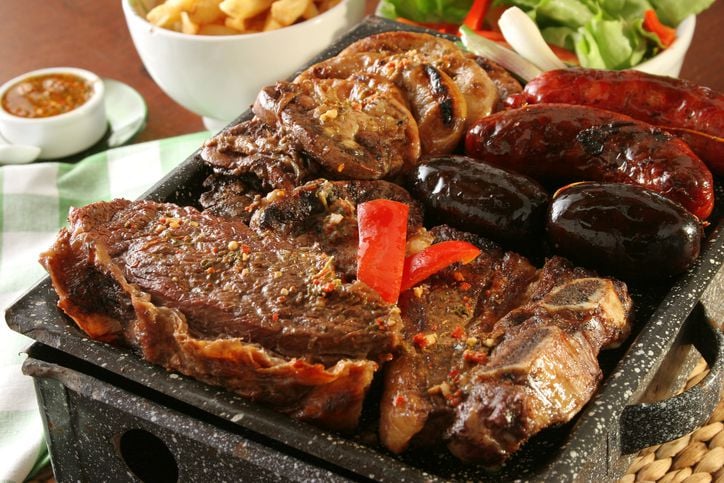Featured
- Get link
- X
- Other Apps
Argentina’s National Dishes: What Defines Argentinian Culinary Identity
When people talk about the national dishes of Argentina, the conversation always goes beyond just steak and Malbec (though let’s be honest, those are legendary). Argentina’s culinary identity is a true melting pot—a blend of indigenous roots, European traditions, and regional creativity that shows up on every plate.

From juicy asado sizzling on a backyard grill to pillowy empanadas passed around at family gatherings, the national dishes of Argentina tell a story of passion, flavor, and community. If you’re curious about what makes Argentinian food so iconic (and drool-worthy), you’re in the right place. Let’s dig into the tastes and traditions that put Argentina on the world food map.
Understanding Argentina’s Culinary Identity
A Blend of Old and New Worlds
Argentina’s food culture emerged at the intersection of:
• Indigenous cooking traditions
• Spanish colonial ingredients
• Massive Italian and European immigration in the 19th–20th centuries
The result? A unique culinary DNA that blends simplicity, bold flavors, rustic techniques, and sophisticated European flair.

The Central Pillars of Argentinian Food
• Meat, especially beef
• Wheat-based products (breads, pastas)
• Corn and native produce in the northwest
• Community-centered meals, like asados
• A deep love for shared drinking rituals (Yerba Mate)

The Core National Dishes of Argentina
1. Asado – The King of Argentinian Meals
Asado isn’t just a meal—it’s a national ritual. Every weekend, families and friends gather to grill:
• Costillas (beef ribs)
• Vacío (flank steak)
• Chorizo (sausages)
• Morcilla (blood sausage)
• Mollejas (sweetbreads)
The asador (grill master) carefully controls wood and charcoal to cook the meat to perfection.
Key cultural significance:
• Symbol of hospitality
• Centerpiece of celebrations
• Representation of rural gaucho traditions
2. Empanadas – The Pocket-Sized National Treasure
Empanadas are the ultimate comfort food in Argentina. Regional varieties include:
• Empanadas Salteñas: Beef, potatoes, spices
• Empanadas Tucumanas: Juicier, spicier
• Empanadas Mendocinas: Beef, onions, green olives, hard-boiled egg
They are:
• Baked or fried
• Eaten as snacks, starters, or even main meals
• Hand-held expressions of local identity
3. Milanesa – Breaded Perfection
The Argentinian twist on European schnitzel. Originally inspired by Italian immigrants, milanesa is:
• Thin beef or chicken cutlet
• Breaded and deep-fried
• Often served “a caballo” (topped with a fried egg)
Milanesa sandwiches (milanesa al pan) are wildly popular as on-the-go meals.
4. Choripán – Street Food Royalty
Think of choripán as the soul of street food in Argentina. It’s a simple sandwich:
• Grilled chorizo sausage
• Crusty baguette or roll
• Smothered in chimichurri or salsa criolla
Often enjoyed at football matches, protests, and street fairs.
5. Locro – The Hearty Stew of Independence
Locro is a dense, satisfying stew made of:
• Corn
• Beans
• Squash
• Beef and pork cuts (sometimes tripe)
Traditionally eaten on national holidays like May 25th (Revolution Day) and July 9th (Independence Day), locro represents unity and national pride.
Other Dishes Deeply Rooted in Argentina’s Culinary Soul
6. Provoleta – Argentina’s Grilled Cheese Masterpiece

Imported Italian cheeses? Check. But Argentinians made them better by grilling.
Provoleta is:
• Disc-shaped provolone cheese
• Grilled until melty inside, crispy outside
• Topped with oregano and olive oil
Perfect accompaniment to any asado.
7. Matambre – The Stuffed Flank Steak
Matambre (meaning “hunger killer”) is flank steak:
• Stuffed with vegetables, eggs, and herbs
• Rolled and slow-cooked or grilled
Served sliced into colorful pinwheels.
8. Dulce de Leche – The Sweet National Obsession
No list of Argentinian food would be complete without dulce de leche:
• Thick, rich caramel made from milk and sugar
• Found in cakes, alfajores, ice cream, and more
• Beloved across generations
Regional Twists on National Dishes
Empanadas by Province

• Salta: Spicy and small
• Tucumán: Juicy with lots of onion
• Mendoza: Milder, with a pinch of sweetness
Asado Styles

• Pampas: Beef-focused
• Patagonia: Lamb-heavy
• Corrientes/Misiones: Freshwater fish and tropical variants
How Argentina’s Food Became a Symbol of Identity
The Gaucho Legacy
Argentina’s cowboy figure, the gaucho, heavily influenced the national culinary image:
• Open-fire grilling
• Simple, hearty meals
• Celebration of rural life
Immigration and Adaptation
From Italian pizzas and pasta to Spanish stews and Middle Eastern spices, Argentina adapted immigrant foods into uniquely national dishes.
Food as a Social Act
Food is rarely solitary in Argentina:
• Long, family-centered Sunday lunches
• Sharing mate with friends
• Public celebrations marked by communal meals
FAQs About Argentina’s National Dishes
Is Asado Considered Argentina’s Official National Dish?
Yes. Although not legally designated, asado is universally recognized as Argentina’s culinary emblem.
What Makes Argentinian Empanadas Special?
Their endless variety by province and deep-rooted indigenous and Spanish heritage.
How Important Is Dulce de Leche in Argentinian Culture?
Very! It’s not just a sweet treat—it’s a beloved national treasure found in nearly every household.
Conclusion

Argentina’s national dishes are more than recipes; they are living traditions passed from generation to generation. Whether it’s the smoky savor of an asado, the golden crust of a hand-folded empanada, or the rich spoonful of dulce de leche on a Sunday afternoon, these foods define the spirit, history, and soul of Argentina.
When you savor an Argentinian meal, you’re tasting a nation’s identity on a plate.
Ready to keep exploring? Check out our next guide: What Do Argentinians Eat for Breakfast, Lunch, and Dinner? to complete your culinary journey!
source https://sazonytumbao.com/national-dishes-of-argentina/
- Get link
- X
- Other Apps
Popular Posts
Common Mistakes When Making Empanadas (And How to Fix Them)
- Get link
- X
- Other Apps
Comments
Post a Comment